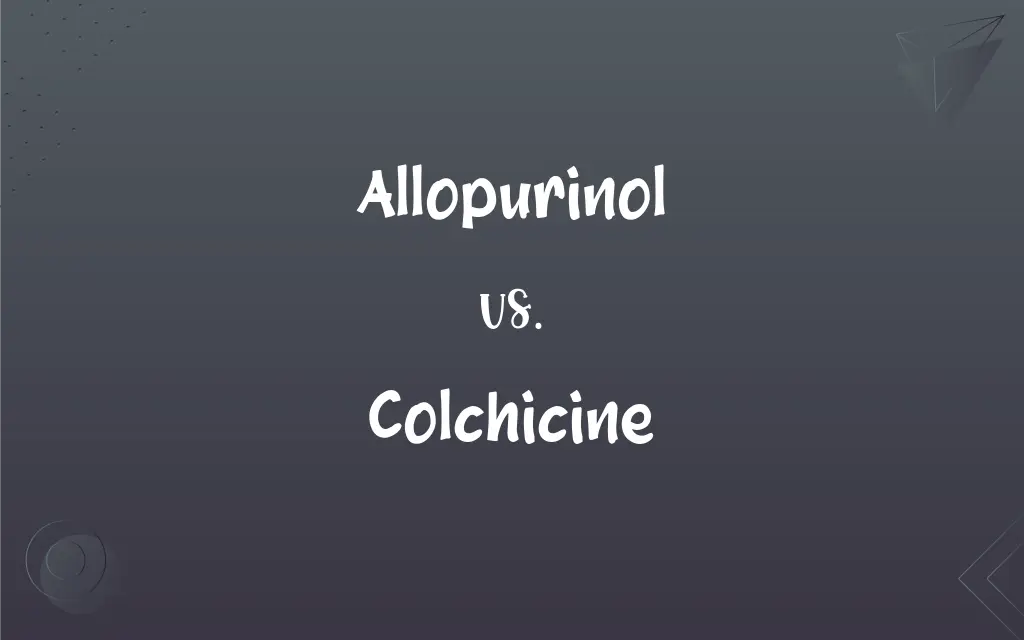Allopurinol vs. Colchicine: What's the Difference?
Edited by Aimie Carlson || By Janet White || Published on January 3, 2024
Allopurinol reduces uric acid production for long-term gout management, while colchicine treats gout flare-ups by reducing inflammation.

Key Differences
Allopurinol works by inhibiting xanthine oxidase, an enzyme responsible for uric acid production, thereby reducing uric acid levels in the body. This makes it effective for long-term gout management and prevention of gout attacks. Colchicine, on the other hand, operates by inhibiting the inflammatory response to uric acid crystals in the joints, providing relief during acute gout flare-ups.
Allopurinol is primarily prescribed for chronic gout management, hyperuricemia, and to prevent gout-related complications. It is often a long-term treatment option for patients with frequent gout attacks or high uric acid levels. Colchicine is indicated for acute gout attacks and, to a lesser extent, for the prevention of gout flares. It is especially useful in situations where nonsteroidal anti-inflammatory drugs (NSAIDs) are contraindicated.
Allopurinol’s side effects can include rash, gastrointestinal upset, and, rarely, severe hypersensitivity reactions. Regular monitoring of liver and kidney function is recommended during allopurinol therapy. Colchicine’s side effects are primarily gastrointestinal, such as diarrhea and abdominal pain, and it can be toxic in high doses, requiring careful dose adjustment.
Allopurinol is typically administered orally and dosed based on uric acid levels and kidney function, requiring ongoing monitoring and adjustments. It is often started at a low dose to minimize the risk of triggering a gout flare. Colchicine can be taken orally for acute gout attacks, often with a higher dose initially followed by a lower maintenance dose, and its use is limited by its side effect profile.
Allopurinol can interact with drugs like azathioprine and warfarin, necessitating dose adjustments. It is contraindicated in individuals with known hypersensitivity to the drug. Colchicine has significant interactions with many drugs, including statins and certain antibiotics, and is contraindicated in patients with renal or hepatic impairment.
ADVERTISEMENT
Comparison Chart
Primary Use
Long-term management of gout
Treatment of acute gout flare-ups
Mechanism of Action
Inhibits uric acid production
Reduces inflammation
Indications
Chronic gout, hyperuricemia
Acute gout attacks, prevention of flares
Side Effects
Rash, GI upset, hypersensitivity reactions
GI issues, potential toxicity
Dosage Considerations
Based on uric acid levels, kidney function
Initial high dose, followed by maintenance
ADVERTISEMENT
Allopurinol and Colchicine Definitions
Allopurinol
Allopurinol reduces uric acid production in the body.
Patients with chronic gout often take allopurinol daily.
Colchicine
Colchicine works by reducing inflammation.
Colchicine's anti-inflammatory action eased her joint swelling.
Allopurinol
Allopurinol inhibits the enzyme xanthine oxidase.
Allopurinol's mechanism involves blocking uric acid production.
Colchicine
Colchicine can prevent gout flares.
She uses colchicine to prevent recurrent gout attacks.
Allopurinol
Allopurinol is used for long-term management of gout.
Her doctor prescribed allopurinol to prevent future gout attacks.
Colchicine
Colchicine is used to treat gout flare-ups.
He took colchicine to relieve his sudden gout pain.
Allopurinol
Allopurinol is a long-term treatment option.
He has been on allopurinol for years to control his gout.
Colchicine
Colchicine requires careful dosing due to toxicity risk.
His colchicine dose was adjusted to avoid side effects.
Allopurinol
Allopurinol treats hyperuricemia by lowering uric acid.
Allopurinol helped lower his elevated uric acid levels.
Colchicine
Colchicine provides relief during acute gout attacks.
Colchicine quickly alleviated his gout symptoms.
Allopurinol
A drug, C5H4N4O, that inhibits uric acid formation in the body and is used to treat conditions, especially gout, that cause elevated uric acid levels.
Colchicine
A poisonous alkaloid, C22H25NO6, that is obtained from the autumn crocus and inhibits microtubule formation. It is used in medicine to treat gout and in plant breeding to produce polyploid plants.
Allopurinol
(pharmaceutical drug) A synthetic drug which inhibits uric acid formation, used to treat gout and related conditions.
Colchicine
A highly toxic alkaloid, chemical formula C22H25NO6, originally extracted from plants of the genus Colchicum and formerly used to treat rheumatic complaints, now used mainly in the treatment of gout.
Allopurinol
A drug (trade name Zyloprim) used to treat gout and other conditions in which there is an excessive buildup of uric acid
Colchicine
A powerful vegetable alkaloid, C17H19NO5, extracted from the Colchicum autumnale, or meadow saffron, as a white or yellowish amorphous powder, with a harsh, bitter taste; - called also colchicia.
FAQs
What is allopurinol used for?
Allopurinol is used for long-term management of gout and lowering uric acid levels.
Is allopurinol a lifelong medication?
For many patients with chronic gout or hyperuricemia, allopurinol is a long-term, often lifelong medication.
Are there any drugs that interact with allopurinol?
Yes, allopurinol can interact with drugs like azathioprine and warfarin, among others.
What is colchicine primarily used for?
Colchicine is primarily used to treat acute gout flare-ups and, to a lesser extent, for gout prevention.
Are there any common side effects of colchicine?
Common side effects of colchicine include gastrointestinal issues like diarrhea and abdominal pain.
Can allopurinol cause side effects?
Yes, allopurinol can cause side effects like rash, gastrointestinal upset, and in rare cases, severe hypersensitivity reactions.
How quickly does colchicine work for gout attacks?
Colchicine usually begins to relieve gout symptoms within 24 hours of taking the medication.
Is colchicine safe for long-term use?
Long-term use of colchicine can be safe but requires monitoring due to potential side effects and interactions.
How does allopurinol work?
Allopurinol works by reducing the production of uric acid in the body.
How does colchicine alleviate gout symptoms?
Colchicine alleviates gout symptoms by reducing inflammation caused by uric acid crystals in the joints.
Does allopurinol interact with alcohol?
While moderate alcohol consumption may not significantly interact with allopurinol, excessive alcohol can exacerbate gout symptoms.
Can colchicine and allopurinol be taken together?
Colchicine and allopurinol can be taken together, especially during the initial period of starting allopurinol therapy.
Can colchicine be used for conditions other than gout?
Colchicine is also used for conditions like familial Mediterranean fever and pericarditis.
What should be monitored while on allopurinol?
Patients on allopurinol should have regular monitoring of liver and kidney functions.
How is the dosage of allopurinol determined?
The dosage of allopurinol is determined based on the patient's uric acid levels, kidney function, and overall health.
Can colchicine be toxic?
Yes, colchicine can be toxic in high doses, so it requires careful dosing.
Can lifestyle changes complement allopurinol and colchicine therapy?
Yes, lifestyle changes like diet modification and weight management can complement the effectiveness of allopurinol and colchicine in gout management.
Can allopurinol be used during a gout attack?
Allopurinol is typically not initiated during an acute gout attack as it can worsen symptoms initially.
How should allopurinol be taken?
Allopurinol should be taken orally, usually once a day, following the dosage prescribed by a healthcare provider.
Is colchicine effective for all types of gout?
Colchicine is effective for most types of gout attacks, particularly during the acute phase.
About Author
Written by
Janet WhiteJanet White has been an esteemed writer and blogger for Difference Wiki. Holding a Master's degree in Science and Medical Journalism from the prestigious Boston University, she has consistently demonstrated her expertise and passion for her field. When she's not immersed in her work, Janet relishes her time exercising, delving into a good book, and cherishing moments with friends and family.
Edited by
Aimie CarlsonAimie Carlson, holding a master's degree in English literature, is a fervent English language enthusiast. She lends her writing talents to Difference Wiki, a prominent website that specializes in comparisons, offering readers insightful analyses that both captivate and inform.






































































